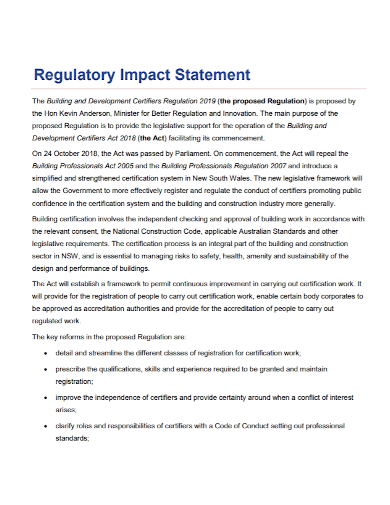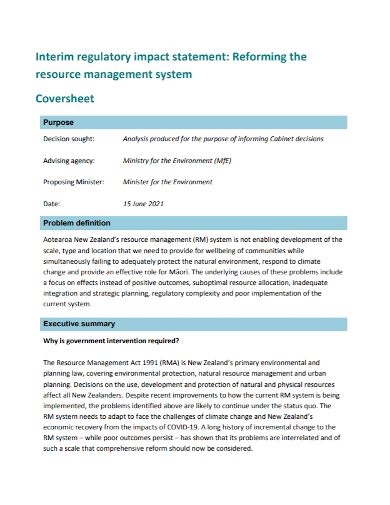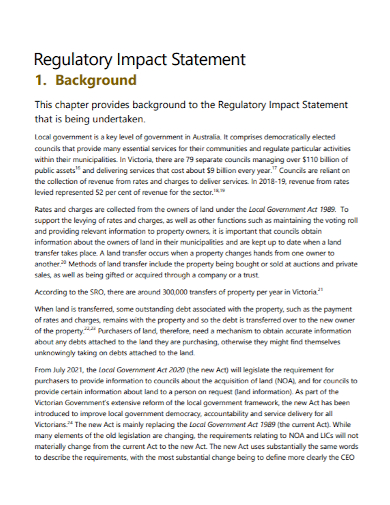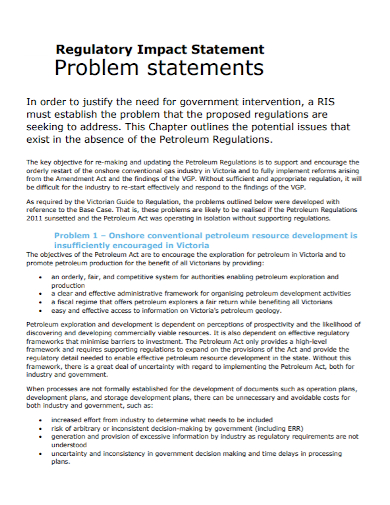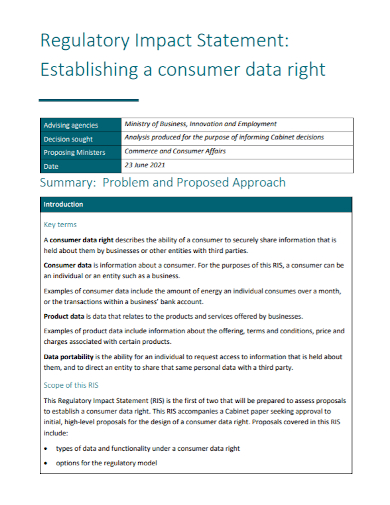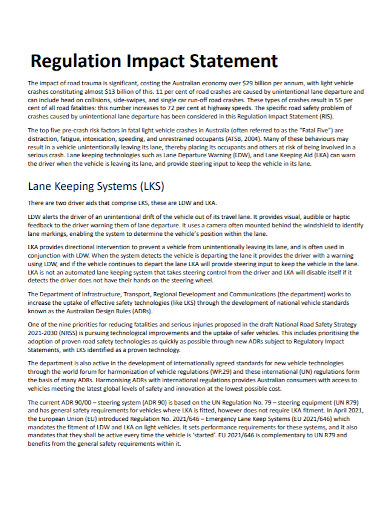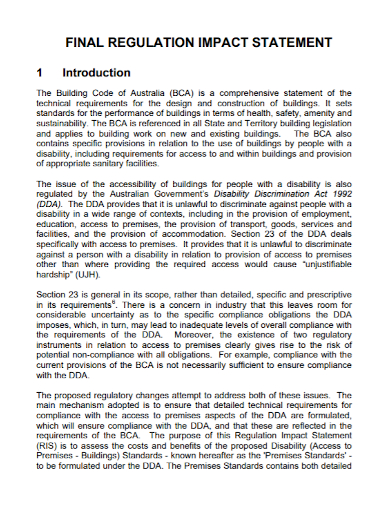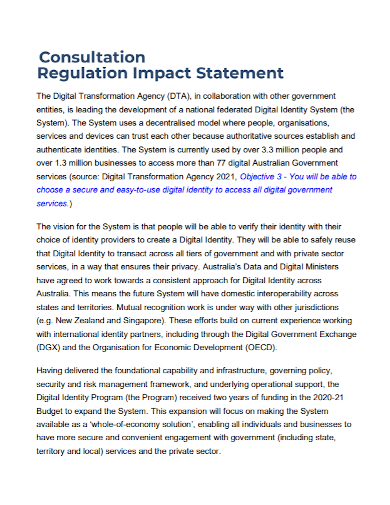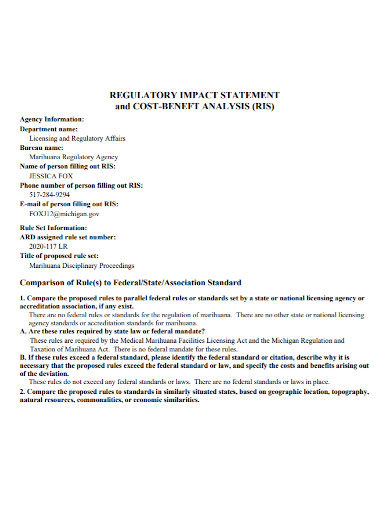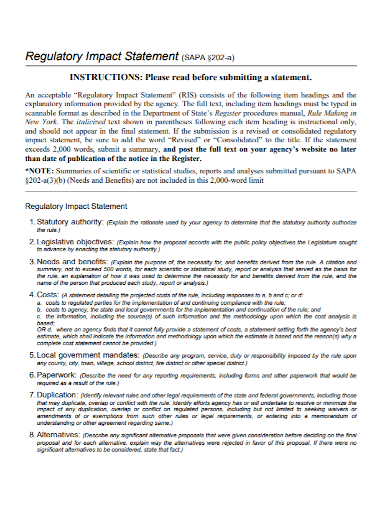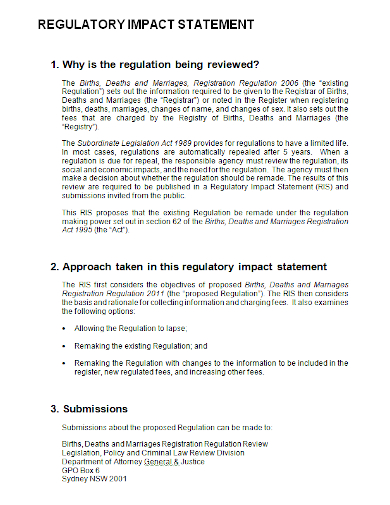By demanding the completion of a full cost-benefit analysis, the Regulation Impact Statement (RIS) procedure aims to assist government officials in moving towards ‘best practice’ regulation design and execution. The creation of a RIS formalizes and publishes the actions that should be followed when enacting legislation. It establishes a method for evaluating different approaches to regulatory issues that is consistent, systematic, and transparent. It comprises a review of the proposed regulation’s and alternatives’ effects on various groups and the community as a whole. The RIS’s main goal is to improve government decision-making processes by ensuring that all relevant data is supplied to decision-makers before they make a choice.
10+ Regulatory Impact Statement Samples
A regulatory impact statement (RIS) summarizes the problem being tackled, the alternatives and their related costs and benefits, the consultation process, and the suggested implementation and review procedures. RISs developed to support the deliberation of regulatory proposals are published at the time the appropriate bill is presented to Parliament or the regulation is gazetted, or at the time of Ministerial release, to help guarantee that the regulatory process is honest and transparent.
1. Regulatory Impact Statement
2. Interim Regulatory Impact Statement
3. Sample Regulatory Impact Statement
4. Regulatory Impact Problem Statement
5. Consumer Data Regulatory Impact Statement
6. System Regulatory Impact Statement
7. Final Regulatory Impact Statement
8. Consultation Regulatory Impact Statement
9. Regulatory Impact Statement Analysis
10. Standard Regulatory Impact Statement
11. Basic Regulatory Impact Statement
What is in a Regulatory Impact Statement?
A regulatory impact statement (RIS) is a document produced by a government agency that outlines the agency’s best advice to its Minister and Cabinet, and includes information such as:
– a statement of the problem to be solved
– the goals of any proposed solution
– a comprehensive list of practical possibilities, as well as an analysis of each one
– any consultations carried out
– the method for implementing, monitoring, and evaluating the solution.
A RIS should give the study of the impact a policy change is likely to have in an objective and balanced manner. It must explain and defend the conclusions reached by the agency. The government guarantees that its choices are transparent to the public by posting all RIS when they are made.
Regulatory Impact Assessment
Regulatory impact analysis (RIA) is a comprehensive technique to evaluating the positive and negative consequences of new and existing rules, as well as non-regulatory alternatives. It refers to a variety of techniques used in OECD countries. It’s a crucial component of a data-driven policymaking approach.
According to an OECD investigation, conducting RIA within a systematic framework can strengthen governments’ ability to guarantee that rules are efficient and effective in a changing and complex world. Despite the fact that all OECD countries have embraced some form of RIA, they have all found the administrative and technological implementation of RIA to be difficult.
A concise paper that explains the relevance of your research work is known as an impact statement. Impact statements are frequently used by researchers and students to respond to questions about the impact of their research on current knowledge in a subject or on a socioeconomic or environmental consequence. The impact statement is used to educate and persuade various parties. Who are the players in this scenario? Stakeholders, such as university administrators, grant program facilitators, or government policymakers, are often in charge of allocating funding. As a result, it justifies why researchers should continue their existing research or undertake a new one.
FAQs
What is one of the best tips that you can use in making an impact statement?
When writing the impact statement, keep your audience in mind. Do not stress your work’s contribution to research in your field if you are writing an impact statement for people who are not researchers in your field! Instead, concentrate on how the research will help the general public. Avoid using jargon that is too specialized or technical. Your viewers might not be experts in your field. Even if they don’t understand all of the arcane terms you employ on a daily basis, your impact statement must persuade them that your work is vital.
What is a good impact statement?
An effective impact statement demonstrates improvement in at least one of the following areas: economic value or efficiency, the state of the environment, and societal/individual happiness.
If you want to see more samples and formats, check out some regulatory impact statement samples and templates provided in the article for your reference.
Related Posts
FREE 10+ Scholarship Statement of Purpose Samples in PDF | DOC
FREE 10+ Engineering Problem Statement Samples [ Software, Mechanical, Civil ]
FREE 30+ Information Statement Samples in PDF | MS Word
FREE 50+ Policy Statement Samples in MS Word | Google Docs | PDF
FREE 50+ Summary Statement Samples in PDF | MS Word
FREE 10+ Nursing School Personal Statement in PDF
FREE 9+ Mortgage Statement Samples and Templates in PDF
FREE 10+ Independent Subcontractor Statement Samples in MS Word | Google Docs | Apple Pages | PDF
FREE 10+ Trust Distribution Statement Samples in PDF
FREE 14+ Compliance Statement Samples & Templates in PDF | MS Word
FREE 10+ Extension Impact Statement Samples in PDF | DOC
FREE 10+ Bank Reconciliation Statement Samples and Templates in PDF | MS Word
FREE 10+ Diversity Mission Statement Samples in MS Word | PDF
FREE 10+ Architecture Statement of Purpose Samples [ Sustainable, Graduate, Master ]
FREE 13+ Project Scope Statement Samples in PDF | MS Word

